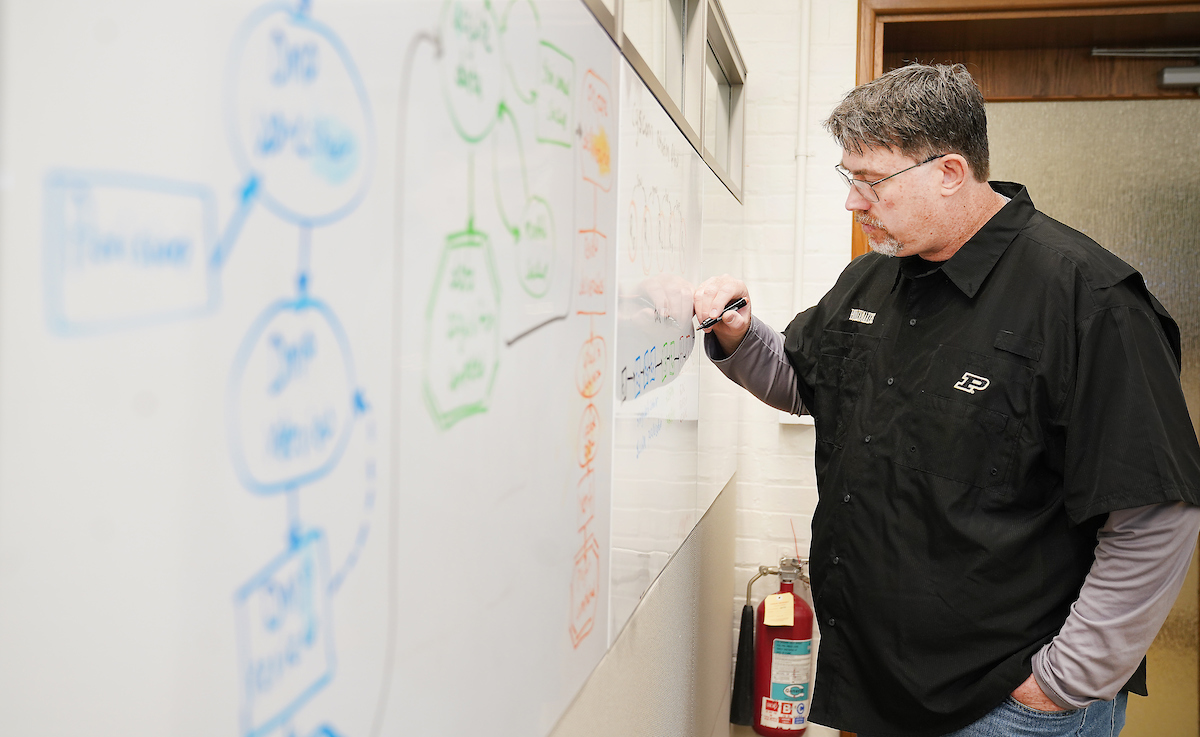Behind the Research: Nathan Denny
About the feature
Many people are involved in the remarkable range of programs, services and facilities that undergird research in the College of Agriculture. Collectively they’re integral to the college fulfilling its research mission. “Behind the Research” explores their individual roles. Each academic year, we profile six people whose work supports the College of Agriculture’s global reputation for developing innovative, multidisciplinary solutions to challenges and then putting those solutions into action.
Nathan Denny, Lead Research Analyst, Ag Data Services
- Focuses on bringing advanced computation techniques, connections to data services campuswide and good data stewardship practices to agricultural research.
- Early in the COVID pandemic, and in partnership with Microsoft, helped create a virtual farmers market prior to the growing season to reassure smaller farmers worried about their markets.
- With his colleague Diane Berg, serves as consultant to the USAID Feed the Future Food Safety Innovation Lab to meet contractual requirements and support global partner programs using the multilingual standardized vocabulary AGROVOC.

As he works across departments in the College of Agriculture, Nathan Denny sees digital assets at risk of vanishing. Part of his role as a lead research analyst with Ag Data Services is to ensure their preservation for future use. The college has soil samples that are 150 years old, he notes. “We preserve physical data, but in the digital world, things may disappear in a few years,” he says.
Working with researchers to ensure the care and retention of data is only part of Denny’s job, and it’s a natural outgrowth of his experience. From 1993 to 1998, the native of Freeburg, Illinois, earned a BS in mathematics and MS in computer science at Southern Illinois University. “Computer science is a great place to go if you’re curious about things,” he says of his academic choices.
His degrees took him first to the University of Arizona, where as part of a cooperative research agreement between the university and the USDA, he worked for the U.S. Arid Land Agricultural Research Center. He then did defense work for a software technology research and development company in Omaha.
When the economy took a downturn, Denny set his sights on returning to a university. “I love academia,” he says. “Purdue was the right time and right place.”
In March 2010 he joined HUBzero at the Rosen Center for Advanced Computing. When HUBzero moved to California in August 2019, Denny stayed at Purdue: “When you have a family, Indiana is a great place to live,” he explains. He transitioned from software engineering to data science, developing new tools for visualizing and exploring large data sets.
His current opportunity came with formation of the ag data services team about two years ago. Its purpose is to help College of Agriculture researchers collect and manage the massive amounts of data that have become common with sensors and other new technologies and to address some of the challenges they present, Denny says. From a researcher’s perspective, “a lot of these problems are things you don’t know that you don’t know.”
“We’re the bridge on the research side,” he says. As part of promoting good data stewardship, ag data services implements the broadly accepted FAIR principles that digital assets should be findable, accessible, interoperable, and reusable.
For example, graduate students often write useful code but then leave Purdue. Denny may be called on to ensure the code can run in the future. “We have some different, relatively recent tools that help us package and preserve unique research codes,” he says. The code is then shelved for reuse, much like books in a library.
“Nathan is leading efforts on putting together an ecosystem of applications that enable college researchers to do things with data they couldn’t just a few years ago, and designing and implementing data pipelines that lead to reusable data and repeatable research,” says Denny’s supervisor, Jarrod Doucette.
Denny also must keep current on resources available on campus and externally — “Researchers may not have time to develop those relationships,” he says — and tap them when needed so researchers don’t have to build everything from scratch.
He especially enjoys interacting with many agricultural disciplines. “We see across the college – you learn something new every day,” he says.
But he also must adapt to the cultures of different departments as well as to widely varying data practices. “Some are on par,” he says. “Other areas are just moving into digital realms. That range along the technical adoption curve has been very interesting and challenging.”
Denny relies on support from other members of the ag data services team, which is small and collegial, he says. “Nobody is an expert across everything, but we have a profound range of skills and knowledge. It’s a fantastic place to work.”






